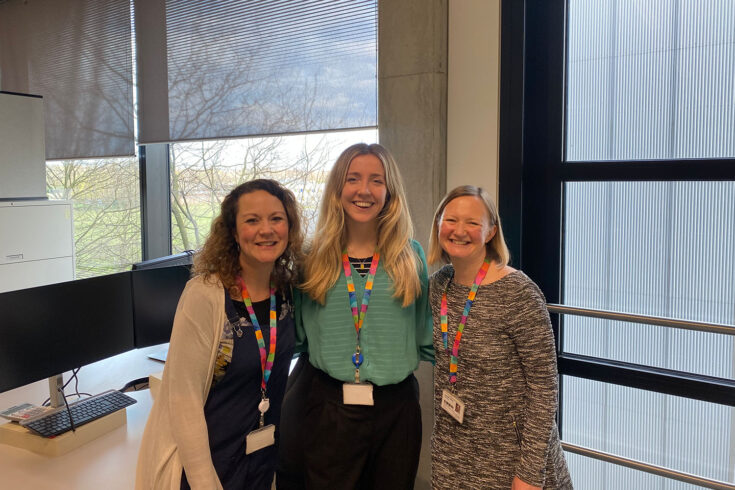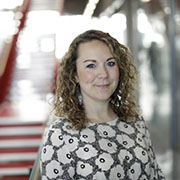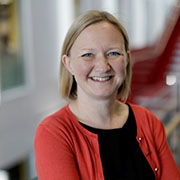Stopping work and going on maternity leave is a time that invokes a myriad of emotions. For some, this may include concern for career progress or anxiety about how a project will survive. In most cases, a period of parental leave entails a total shutdown of a project. Finding or paying for cover is notoriously difficult.
For academic researchers, whose contracts are often short, and non-extendable, there’s the added fast paced nature of science and the pressure to publish. This can make balancing the needs of a career with a desire to focus on the joy and pain of becoming a new parent feel like an impossible task.
Unpausing the science
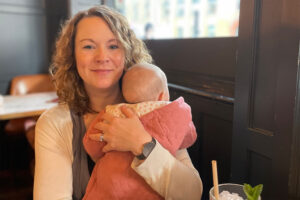
Michelle Percharde with her baby.
Credit: MRC LMS
To tackle this, we wanted to start a scheme that would help mitigate the impact of leave away from the lab. Its goal would be to cover any type of long-term leave that Medical Research Council (MRC) Laboratory of Medical Sciences (LMS) employees might need to take.
We knew the biggest impact would be to those taking maternity leave since the majority of long-term leave requests at the MRC LMS have been for this purpose. Mothers needing to take time off to have children is recognised as a leading factor contributing to the gender gap in academia. While postdocs make up roughly half of the scientific workforce, studies around the world consistently report that only around 25% tenured professors are women.
Roving researcher scheme
These factors motivated us to start the first ‘Roving Researcher scheme’ at the MRC LMS, which was pioneered at the Babraham Institute in April 2020.
The scheme provides part-time cover to continue key aspects of someone’s research while on periods of leave for three months or more. At the same time, the recruited ‘rover’ would have a unique task to work across diverse projects, techniques and fields in a long-term experimental position. Their position would also allow them to help many people.
Getting the right person for the job
Many of the qualities we looked for in a roving researcher were similar to those we look for in applicants to ‘standard’ postdoctoral roles. But the individual would also need to let projects go at the end of their cover, manage the demands of multiple postdocs and switch between tasks very quickly.
Our first and second roving researchers, electrophysiologist, Alice Francis, and molecular biologist, Stephanie Mo, have these qualities and more. They have ensured the success of the scheme at the MRC LMS.
How it works
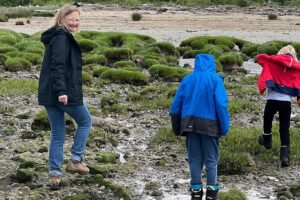
Alexis Barr with her kids.
Credit: MRC LMS
To request support from the roving researcher, someone going on leave fills in a simple form and sends this to us, as the oversight committee. We review the applications and discuss with the roving researcher how to best allocate their time between projects.
The roving researcher will then usually have a two-week intense training period with the person going on leave to get up to speed with the new project. In most cases, the individual is covering two projects at once, occasionally three.
Roving researchers for the long-term
We started the scheme as a two-year pilot. However, within the first year it became clear that our roving researcher role was having such a positive impact that the scheme was made permanent.
In addition to the expected benefits to the postdocs on leave we also noticed a morale boost to the whole institute. Without the added pressures of trying to build their own CVs for their next career step, our roving researcher has more time to dedicate to other institute-wide committees and events.
Looking forward to widening participation
Now with our scheme about to enter its third year, we are keen to increase the impact and influence of the roving researchers. Alice will stay associated with the scheme and plans to establish a UK-wide network of such researchers, enabling them to draw from shared experiences, advice and encouragement.
Our dream going forwards is for every research institute and university to have its own roving researcher. We also want to encourage more partners of new mothers to take up the scheme to cover their own projects while they choose to take shared parental leave. Enabling scientists to take time away and still support impactful, discovery science isn’t just a win for the researcher, but a win for us all.
A scheme where everyone benefits
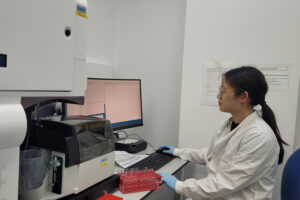
Stephanie Mo in lab.
Credit: MRC LMS
Stephanie, who started in April and is excited to get stuck in, said:
The roving researcher role is a research opportunity like no other. It is rare to find a research position that allows you to be involved in multiple research areas, where you learn and develop different lab skills. The role combines my love for scientific research and helping others.
The scheme enabled postdoc biochemist, Gemma Fisher, to have a positive experience of taking maternity leave, when she welcomed twin daughters into the world in May 2023. She said:
By being able to continue development and work towards my project, I removed any sense of guilt I suspect I would have felt if the project had been effectively paused for my collaborators in my absence. It has also meant my recent return to the lab has not felt like a jarring transition and more of a continuation of what I was simply always doing.

